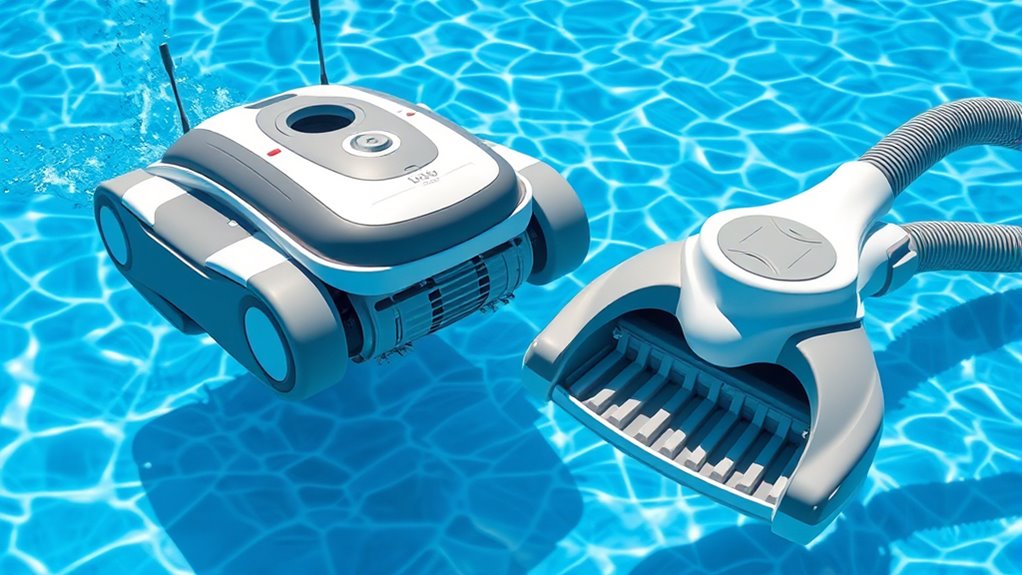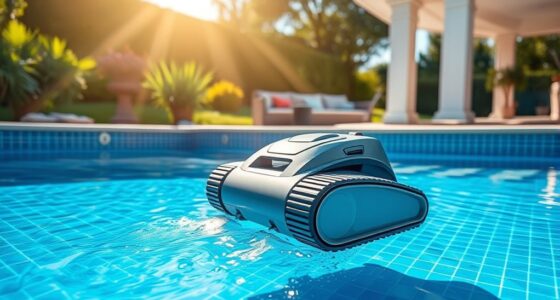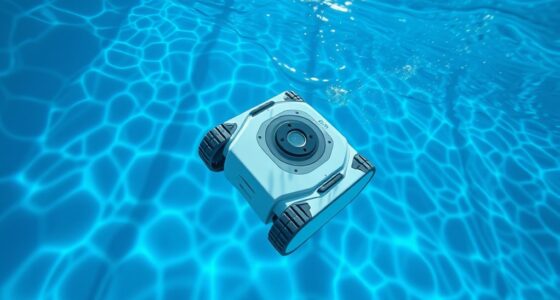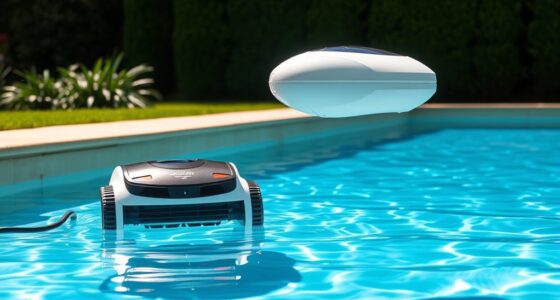Robotic pool cleaners offer automated, thorough cleaning with minimal effort, making them ideal for complex pools, but they come with higher upfront costs and require regular maintenance like software updates and battery replacements. Conversely, suction cleaners are budget-friendly, energy-efficient, and easy to operate, relying on your pool’s pump, which may limit their effectiveness on large debris or complex shapes. To discover which option fits your needs best, explore the detailed advantages and disadvantages further.
Key Takeaways
- Robotic cleaners are fully autonomous, offering thorough cleaning with minimal manual effort, unlike suction cleaners which rely on pool pump performance.
- Robotic models are more expensive upfront but provide advanced features and easier maintenance compared to budget-friendly suction cleaners.
- Suction cleaners are energy-efficient, simple to operate, and depend on existing pool filtration systems, whereas robotic cleaners require software updates and battery care.
- Robotic cleaners excel at cleaning complex shapes and stubborn dirt independently, while suction cleaners may struggle with larger debris and complex pool layouts.
- Overall, robotic cleaners offer reliable, customizable, and low-maintenance cleaning, while suction cleaners are practical, economical, and easier to install.
Advantages and Disadvantages of Robotic Pool Cleaners
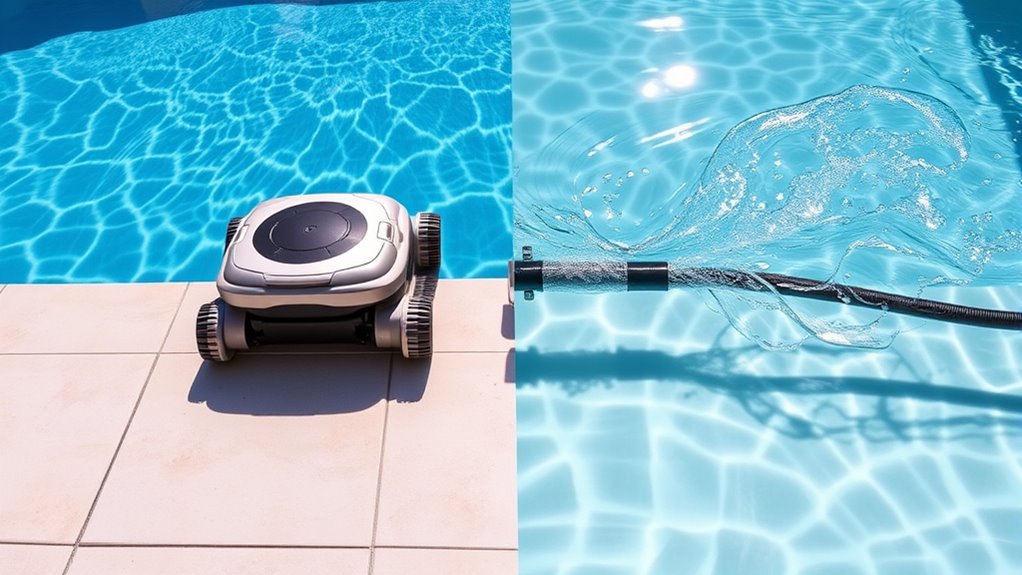
Robotic pool cleaners offer several advantages that make them a popular choice for pool owners. One key benefit is their automation efficiency, which allows them to clean your pool thoroughly with minimal manual effort. Once set up, they operate independently, maneuvering the pool’s surfaces and targeting dirt, algae, and debris effectively. When it comes to maintenance requirements, robotic cleaners are generally low-maintenance compared to other types. You’ll need to regularly check and clean their filters and ensure power sources are functioning properly. Their self-contained design means fewer parts to repair or replace over time. Additionally, battery life in robotic pool cleaners can vary, impacting how long they can operate before needing a recharge. Properly managing energy consumption can help prolong their operational time and efficiency. Some models also feature programmable cleaning cycles, allowing for more customized and efficient cleaning schedules. Furthermore, advancements in battery technology continue to enhance the overall performance and reliability of robotic pool cleaners. However, keep in mind that robotic cleaners can be more expensive upfront and may require occasional software updates or battery replacements. Still, their ease of use and reliable performance often justify the investment.
Advantages and Disadvantages of Suction Pool Cleaners
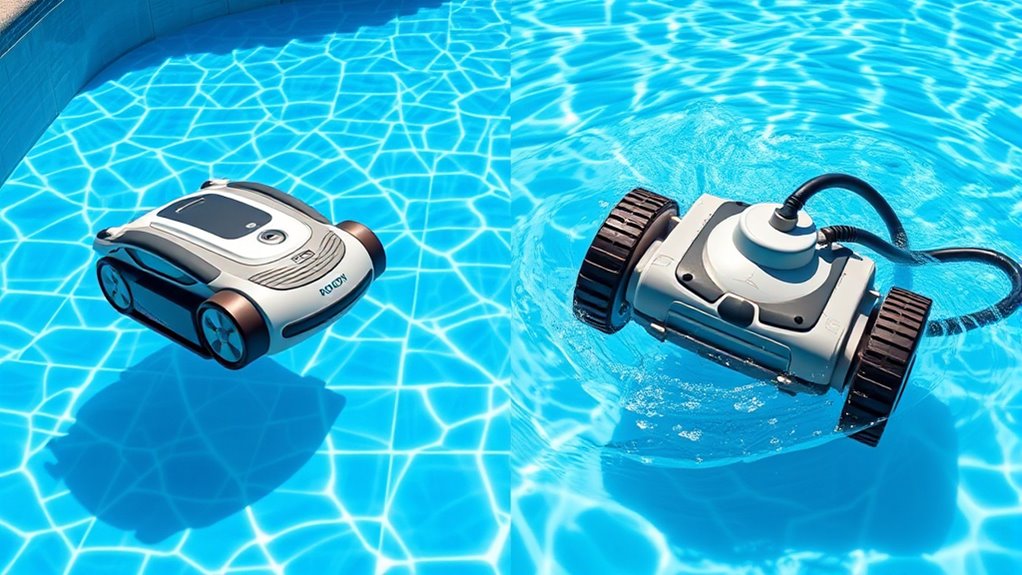
Suction pool cleaners are a straightforward and cost-effective option for maintaining your pool’s cleanliness. They connect directly to your skimmer or dedicated suction line, making pool maintenance simple and affordable. One advantage is their energy efficiency, as they use minimal power compared to more complex systems. However, they can be less effective on larger debris or in pools with complex shapes, requiring manual intervention or additional cleaning tools. Suction cleaners also depend on your pool’s pump performance, which can impact cleaning efficiency. They are generally easy to install and maintain, but their reliance on pool filtration systems may limit their ability to clean every corner thoroughly. Regular checks for signs of spoilage in components or debris buildup can enhance their performance and longevity. Additionally, understanding the different types of pool cleaners can help you choose the best option for your needs. Proper maintenance and timely repairs can further improve their efficiency and lifespan. Overall, suction pool cleaners are a practical choice if you seek an economical, low-energy solution for regular pool upkeep.
Frequently Asked Questions
Which Type of Cleaner Is More Energy-Efficient?
You want to know which cleaner uses less energy, focusing on energy consumption and power efficiency. Generally, robotic pool cleaners are more energy-efficient because they operate on low power and are designed to optimize cleaning cycles. Suction cleaners often rely on your pool’s pump, increasing overall energy use. So, if saving energy is your priority, robotic cleaners tend to be the better choice, offering better power efficiency and lower energy consumption.
How Long Do Robotic and Suction Cleaners Typically Last?
Think of your pool cleaner as a trusty companion on a long journey. Robotic cleaners typically last 3-5 years, while suction cleaners may endure 5-7 years with proper maintenance. You’ll find robotic models often have higher maintenance costs but offer greater user convenience, thanks to automation. Suction cleaners might need fewer repairs, but their lifespan depends on regular upkeep. Choose based on how long you want your cleaner to serve you well.
Can These Cleaners Handle Large Debris Effectively?
You might wonder if these cleaners can handle large debris effectively. While robotic and suction pool cleaners have decent debris capacity, their ability to manage big debris varies. Robotic cleaners often handle larger debris better but can face blockage issues if debris gets lodged. Suction cleaners may struggle with large debris, risking clogs and reduced efficiency. Regular maintenance helps prevent blockage problems and keeps your cleaner working smoothly.
Are There Specific Pool Sizes Better Suited for Each Cleaner Type?
Did you know that over 60% of pool owners prefer robotic cleaners for larger pools? When choosing, consider your pool surface and debris capacity needs. Smaller pools (under 20,000 gallons) often suit suction cleaners, which handle debris efficiently on flat surfaces. For larger or complex pools, robotic cleaners excel with their higher debris capacity and ability to navigate uneven surfaces, making them a smarter choice overall.
What Maintenance Is Required for Robotic Versus Suction Pool Cleaners?
For robotic pool cleaners, you’ll need to regularly replace filters and check the battery, especially after extended use. Suction cleaners require less maintenance, mainly cleaning the filter basket and ensuring the hose stays clear. Both types benefit from routine inspections to keep them running smoothly. Keep an eye on filter replacement for peak cleaning performance, and for robotic models, don’t forget battery maintenance to prolong their lifespan.
Conclusion
Choosing between robotic and suction pool cleaners is like selecting the perfect dance partner—each has its own rhythm and charm. Robotic cleaners glide gracefully, handling the job with quiet confidence, while suction models work tirelessly in the background, quietly maintaining your pool’s sparkle. Consider your pool’s size and your preferences. Whichever you choose, you’ll find your pool’s gentle shimmer, like a calm lake at dawn, waiting to invite you in for a revitalizing dip.
